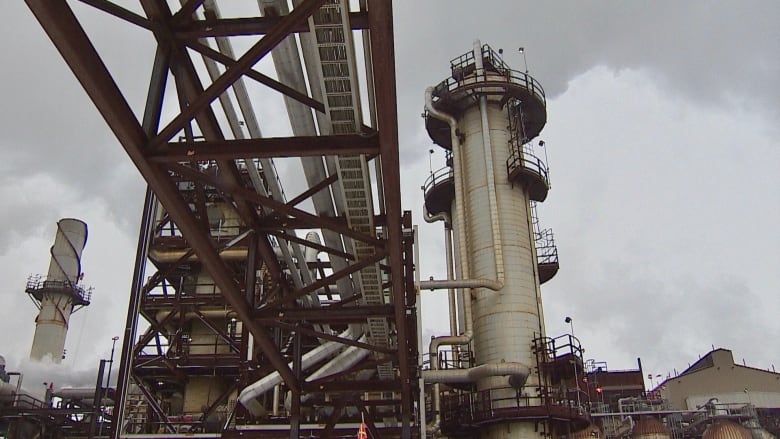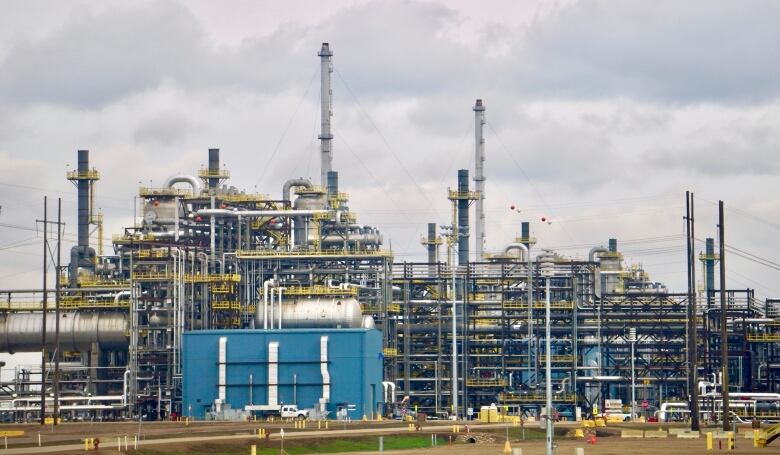[ad_1]
To listen to of some candidates looking for to be the chief of Alberta’s governing UCP – and the province’s subsequent premier – one would possibly assume the oil and fuel trade was struggling to make a buck.
In actual fact, Canada’s oilpatch is having fun with its most profitable 12 months on document. Its income have been described as a damaged money machine, as the biggest firms make billions in income each few months.
Nonetheless, a significant problem hasn’t gone away: discovering a approach to lure again international banks, insurance coverage companies and traders who do not need to interact with an trade – particularly oil sands – has turn into a goal within the international local weather disaster. . It is one purpose why the biggest oil and oil producers have pledged to remove their greenhouse fuel emissions by 2050 (a pledge many environmental teams discover questionable).
However whereas the large oil and oil gamers are busy speaking up their efforts to cut back emissions, there may be little consideration paid to the surroundings, on UCP’s marketing campaign path, in terms of acknowledging international warming or local weather change. Simply go away it.
no extra net-zero discuss
Within the get together’s first official management debate, candidate Danielle Smith said that Alberta might obtain the aim of reaching net-zero emissions by 2050, a aim set by the federal authorities, as have many non-public sector firms, Together with the large oilpatch gamers. His opponents shortly jumped.
Smith, whose marketing campaign centerpiece is an act she says would enable Alberta to refuse to implement any federal legal guidelines, was truly attacked for supporting the federal liberal authorities. and promote an concept {That a} candidate stated would bankrupt the province.
Candidate Todd Lowen, who is basically aligned with Smith, was adamant that he did not even need to discuss Web Zero and wished to oxygenate the dialogue.
“It is all bull. It is all BS,” he stated throughout a debate final month. “We have to cease speaking about these money-wasting concepts. Nothing good will ever occur with these issues.”
Smith hasn’t talked about “net-zero” since. His authentic feedback have been about how the province might attain local weather targets by the event of a hydrogen trade and a rise within the variety of carbon seize and storage initiatives in Alberta.
With reference to the surroundings, his focus has been on how Canada exports extra pure fuel internationally to displace coal and different heavy-emitting sources of power, whereas advocating for extra pipelines and rising oil and pure fuel manufacturing. ought to do.
“Speaking about phasing out bitumen is as foolish as speaking about phasing out cement or phasing out metal,” he later stated throughout a debate.
Smith’s stance is notable as a result of specialists say the science behind local weather change was but to be unraveled, a purpose he was defeated within the 2012 provincial election as Wildrose’s then-leader.

Candidates emphasize the necessity for extra pipelines
Extra pipelines are a typical level of emphasis by candidates, particularly these transporting pure fuel that they hope could have extra export terminals on any given shoreline, whether or not to the east, west or north. Advocating for extra refineries and pledging to make cheaper gasoline Even on the pumps.
On this marketing campaign path, there’s a recurring theme when discussing the surroundings: Let’s pump extra oil and pure fuel off the bottom.
Candidate Brian Jean stated throughout a debate final month, “We’d like to ensure we empower our industries to be the perfect on this planet they’re now, however then for everybody to get their oil. “
Greatest-in-class will be measured in several methods, however in terms of local weather change, oil and oil fields are nonetheless an unlimited supply of greenhouse fuel emissions in comparison with oil produced elsewhere on this planet.
Some candidates lament how some pipeline proposals have failed over the previous decade and level the finger on the federal authorities. They’re additionally involved about how some federal insurance policies would possibly have an effect on the oilpatch, akin to proposed limits on emissions.
“We have seen a federal authorities that hasn’t tried to destroy our oil and fuel trade. They’re actually destroying it proper now,” Lowen stated.
That is an odd means for a politician to explain an trade that loved document income this 12 months.
Enormous income in ‘Patch’
Oilpatch will surely welcome and assist a few of these marketing campaign guarantees, even when, in actuality, it isn’t in dire want of assist from a manufacturing standpoint.
In actual fact, oil manufacturing in Alberta is at document highs, there may be export pipeline capability of extra crude oil and the monetary efficiency of the trade is the envy of Canada’s financial system.
Development on the federally owned Trans Mountain Pipeline growth is greater than 50 % full.
There isn’t any main push by oil firms to construct new giant initiatives, whether or not in oil or elsewhere within the province, as they repay debt and filter income to traders.
There are some challenges on the pure fuel entrance as export pipelines are being optimally utilized. There are some LNG export amenities below building in British Columbia, which can be useful for the area.
The worldwide power disaster has pushed pure fuel costs up and lots of specialists (and corporations) consider the commodity has potential for progress. Alberta has plenty of pure fuel, however the province has restricted potential to extend exports as a result of it must construct extra pipelines and export amenities in collaboration with different provinces and the federal authorities.

Criticism of Smith’s Sovereignty Act proposal
Whereas fingers are being pointed on the federal authorities, there may be additionally criticism about whether or not a candidate’s insurance policies might not directly hurt the oilpatch.
Smith is proposing a Sovereignty Act that may enable Alberta to refuse to implement any federal legislation or court docket determination that’s opposite to the pursuits of the province.
Some candidates have raised objections, partly due to the uncertainty it might trigger to traders if the rule of legislation is just not enforced.
“It would create chaos on this enterprise surroundings. It would ship tens of billions of {dollars} packing from this province. It would undo all of the features we have remodeled the previous three years,” stated candidate Travis Toes, who was from the beginning of the marketing campaign. First Alberta Finance Minister.
Smith has stated that his proposed coverage would truly encourage extra funding, though enterprise teams disagree.
Alberta Vitality Minister Sonya Savage stated in a latest Edmonton Journal column that the proposed act might be as damaging to Alberta’s future as Trudeau’s insurance policies have been to the province’s previous.
She famous that worldwide traders involved about her Alberta belongings have been asking her in regards to the Sovereignty Act.
Alberta’s behind-the-scenes motion on emissions
The world’s high physique of local weather scientists has warned of the implications of inaction if nations proceed to decrease their local weather targets, because the planet is already experiencing a measurable improve in disasters akin to flash floods. , longer droughts, extra intense storms and longer burning forest fires.
Duane Bratt, professor of political science at Mount Royal College in Calgary, stated that in recent times, the UCP authorities has typically clashed with environmental teams and bashed the federal authorities over local weather change, however behind the scenes it has labored arduous to cut back emissions. A number of steps have been taken for
The UCP authorities below Premier Jason Kenney has spent cash selling the event of the carbon seize and storage, hydrogen and petrochemical industries, working with Ottawa on insurance policies akin to lowering methane emissions.
UCP additionally continues to impose a carbon tax on emissions-heavy industries within the province.
“The federal government is actually engaged on local weather points, however privately,” Bratt stated in an interview.
“I name it ‘public kenny versus non-public kenny,'” he stated.

Ignoring the difficulty is not going to finish the matter
As with every election, there may be all the time uncertainty about how any candidate will truly rule.
That is very true in any such marketing campaign the place UCP members are selecting their new chief and chief. The candidates are conveying their message to the members of their get together particularly and to not most of the people.
There’s little consideration paid to environmental points by these anticipated to rule the province and the absence of an acknowledgment of the emissions downside the trade is making an attempt to keep away from.
Many nations world wide are pushing to boost oil and pure fuel manufacturing to decrease costs, fight inflation and guarantee sufficient power to warmth properties by the winter in components of Europe.
Nonetheless, if Oilpatch wants assist, it’s on local weather points, akin to researching new applied sciences and dealing with trade to cut back environmental impacts.
In recent times, Oilpatch representatives have described how the trade has undergone a sea change in its understanding of the local weather change situation, with many firms making net-zero commitments and every part from hydrogen to carbon seize and storage to wind. Investing in every part, even power.
As an alternative of feeling panic over the difficulty of local weather change, some firms are in search of alternatives to transition to much less emitting sources of power.
In latest weeks, whereas management candidates shrink back from local weather change throughout public debates and boards, a bunch representing massive oil firms has been working advertisements saying: “Let’s clear the air: Carbon emissions in Canada Oil sands have a big contribution on this.
The trade appears to need to focus on the difficulty greater than the politicians vying for the highest political job within the province.
[ad_2]
Supply hyperlink